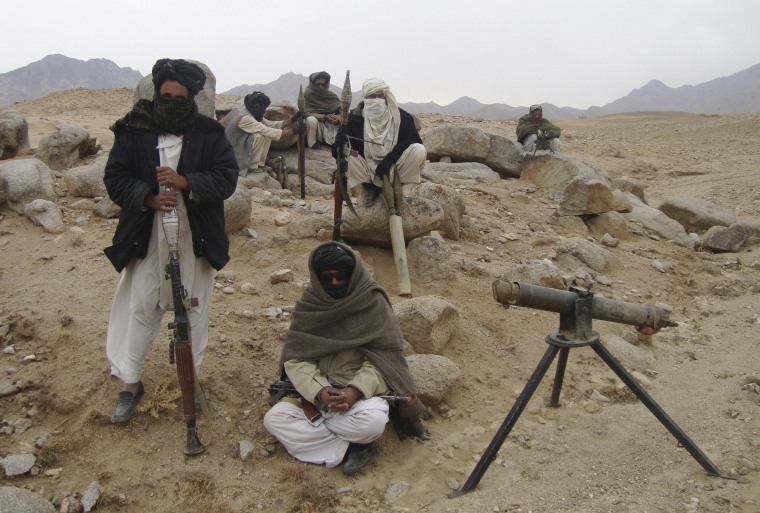PESHAWAR, Pakistan — The Afghan Taliban last week stalled peace talks with the U.S. after the American delegation demanded the militant group announce a ceasefire and release a U.S. academic it is holding, four senior Taliban officials told NBC News.
A Taliban commander in Afghanistan's Helmand province said U.S. negotiators had “asked us to first release the American professor whom we kidnapped after an attack on American University in Kabul.”
Like other militants NBC News interviewed, he spoke on condition of anonymity because he is not authorized to comment on negotiations.

The Taliban leader called the alleged demand “unrealistic” and said the militant group was putting peace talks aimed at ending America's longest war on ice.
Kevin King was kidnapped at gunpoint from the American University of Afghanistan in Kabul alongside Australian colleague Timothy Weeks in August 2016.
The Taliban have said King is seriously ill and previously commented that he requires hospital treatment for his heart disease. The Taliban leader said U.S. special envoy Zalmay Khalilzad had threatened the group if anything were to happen to King despite knowing that he was sick.
American officials in Kabul declined to comment on the comments from Taliban leaders, and instead pointed to Khalilzad's Twitter account.
On Saturday, he tweeted that while "the U.S. wants peace" and it was "urgent that fighting end."
"But pursuing peace still means we fight as needed," he added.
The State Department declined to comment on Sunday.
Taliban fighters have been battling U.S., NATO and Afghan government forces since being toppled in 2001 after their government sheltered 9/11 mastermind Osama bin Laden. They are widely thought to be on the ascent and are again imposing their strict version of Islam on swathes of the population.
Senior Taliban officials claimed that when they agreed to engage in peace talks last year, U.S. officials told the group three major issues would be discussed: The withdrawal of U.S. forces from Afghanistan, prisoner swaps and lifting the ban on the movement of Taliban leaders.
But on meeting the U.S. delegation in the United Arab Emirates, the Americans instead called on the release of the American professor, as well as for an “unconditional” ceasefire to end their 18-year-long war.
The talks involved Saudi, Pakistani and Emirati representatives.
The Taliban said besides the two “unrealistic demands” of U.S. delegation, the talks were damaged by the internal differences of Arab countries particularly animosity between Saudi Arabia and Qatar and Qatar and the United Arab Emirates.
NBC News could not confirm the Taliban’s claims and it was not clear what the group had agreed to concede in the negotiations.
Tweeting after the latest round of talks in the United Arab Emirates last month, Khalilzad said that the negotiations had been “productive.”
But the Taliban rejected reports in the Pakistani media Saturday that they were prepared to resume meetings with Khalilzad in Islamabad and repeated their refusal to deal directly with the Afghan government.
In November, foreign diplomats and former U.S. officials told NBC News that Khalilzad was reaching out to many top Taliban figures before President Donald Trump could pull the plug and order U.S. troops home.
In December, as Trump announced he would be pulling U.S. troops out of Syria, the White House also ordered the Pentagon to draw up plans for a troop withdrawal from Afghanistan, two defense officials and a person briefed on the matter told NBC News.
The plans were due shortly after the new year, according to the officials. They cautioned that no decision has been made, but Trump wanted to see options.
Experts and former officials caution that the president raising the possibility of withdrawal puts the Taliban in a stronger negotiating position.
U.S. Republican Senator Lindsey Graham met with Pakistani leaders on Sunday and afterward said that he would encourage the president to speak with leaders from Pakistan and Afghanistan to end the war, according to the Associated Press.
The Taliban have consistently refused direct talks with representatives of the Afghan government, which they have said are U.S. puppets. Pakistan has long been suspected of supporting and sheltering Taliban militants — a claim the government denies.
Mushtaq Yusufzai reported from Peshawar, Pakistan, Ahmed Mengli from Kabul, Afghanistan, and Saphora Smith reported from London.


